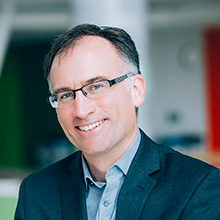
Carl-Éric Aubin
Country: Canada
Affiliations:
Full Professor, Dept. Mechanical Engineering & Biomedical Eng. Institute, Polytechnique Montreal
Polytechnique Montréal Research Chair in Orthopaedic Engineering
Chief Executive and Scientific Officer – Montreal TransMedTech Institute
Adjunct Professor, Dept. Surgery, Faculty of Medicine, University of Montreal
Researcher & Special Advisor on Innovation, ARC - Sainte-Justine University Hospital Center
Biography:
Carl-Éric Aubin is a full professor in the Department of Mechanical Engineering and the Institute of Biomedical Engineering at Polytechnique Montréal, a researcher and special advisor on innovation at CHU Sainte-Justine and an adjunct professor in the Department of Surgery at Université de Montréal. Pr Aubin is also Executive and Scientific Director of the TransMedTech Institute, which he founded to accelerate the development of innovative medical technologies. His research focuses on the biomechanical modeling of spinal deformities, such as scoliosis, and on the optimization of orthopedic treatments. Pr Aubin has published over 320 scientific papers and articles in edited books, over 700 abstracts in conference proceedings, and is co-author of 9 patents. He has received numerous honors, including Officer of the Order of Canada in 2021, Officer of the Ordre National du Québec (2024) and Knight of the Order of Montreal in 2023. He also received an Honorary Doctorate from Aix-Marseille University (2018). Pr Aubin is a member of several professional associations, including the Ordre des ingénieurs du Québec. He is a Fellow of the Canadian Academy of Engineering and of the Scoliosis Research Society, and Scientific Director of the Quebec Scoliosis Society.
Websites:
https://www.polymtl.ca/expertises/en/aubin-carl-eric
https://www.linkedin.com/in/carlericaubin/
https://transmedtech.org/en/
Catalyzing Innovation in Healthcare Technologies: the TransMedTech's Living Lab Platform
Prof. Carl-Éric Aubin O.C., O.Q., P.Eng., Ph.D., ScD (h.c.), Ch.O.M., FCAE
Chief Executive and Scientific Officer – Montreal TransMedTech Institute
The health technology and innovation sector continues to grow rapidly worldwide and is central to the transformation of healthcare systems. Aging populations, rising healthcare costs, workforce shortages, and ongoing socio-political and environmental disruptions are compounding pressures on already strained health systems. These challenges have accelerated the need for faster, more inclusive, accessible, and more responsible innovation models. The post-COVID era has further underscored the importance of adopting agile, collaborative, impact-driven, and accessibility-conscious approaches that ensure equitable benefit across diverse user populations.
We are witnessing unprecedented momentum in the development of advanced medical technologies, digital health tools, and AI-powered solutions. Yet, this rapid growth unfolds within complex, highly regulated healthcare systems, often creating tension between the speed of innovation and the practicalities of clinical adoption. Simultaneously, societal expectations are evolving: innovation must now embody values of equity, inclusiveness, accessibility—including physical, digital, and cognitive dimensions—environmental sustainability, and long-term value creation that serves both individuals and communities.
Responding to these imperatives requires that innovation ecosystems evolve continuously toward models that are not only technologically robust, but also socially responsible, ecologically viable, and attuned to diverse user needs. Sustainable, accessible, interoperable, and value-based innovation must become the norm rather than the exception. Open innovation models—such as Living Labs—provide a powerful framework to achieve this transformation. The TransMedTech Institute exemplifies such a model. Operating as a Living Lab embedded within an ISO 13485-certified quality management system, TransMedTech mobilizes a diverse community of researchers, engineers, students, clinicians, patients, caregivers, industry leaders, health system stakeholders, and policy-makers. These actors collaborate as co-innovators throughout the entire lifecycle of health technologies—from research and validation to integration and implementation in real-world environments.
This collaborative and interdisciplinary ecosystem has catalyzed over 140 healthtech projects, supported through customized intermediation services, co-development platforms, regulatory strategy support, and clinical integration pathways. TransMedTech’s model ensures that innovations meet rigorous standards of performance, relevance, usability, cost-efficiency, and societal impact. It also actively mitigates barriers to adoption and commercialization, anchoring innovation in the needs and realities of users and health systems.
This lecture will outline the experience accumulated in the development and operation of the TransMedTech open innovation ecosystem since its inception in 2016. It will examine the foundational principles that informed its implementation, key milestones and achievements, as well as the ecosystem’s contributions to advancing inclusive, sustainable, accessible, and value-based health innovation. The presentation will also highlight the impacts generated across the innovation ecosystem, while offering forward-looking perspectives on how Living Labs such as TransMedTech can continue to play a transformative role in strengthening the medtech innovation landscape through interoperable and socially responsible technologies designed for broad adoption—fostering a more dynamic, connected, and inclusive medtech future.